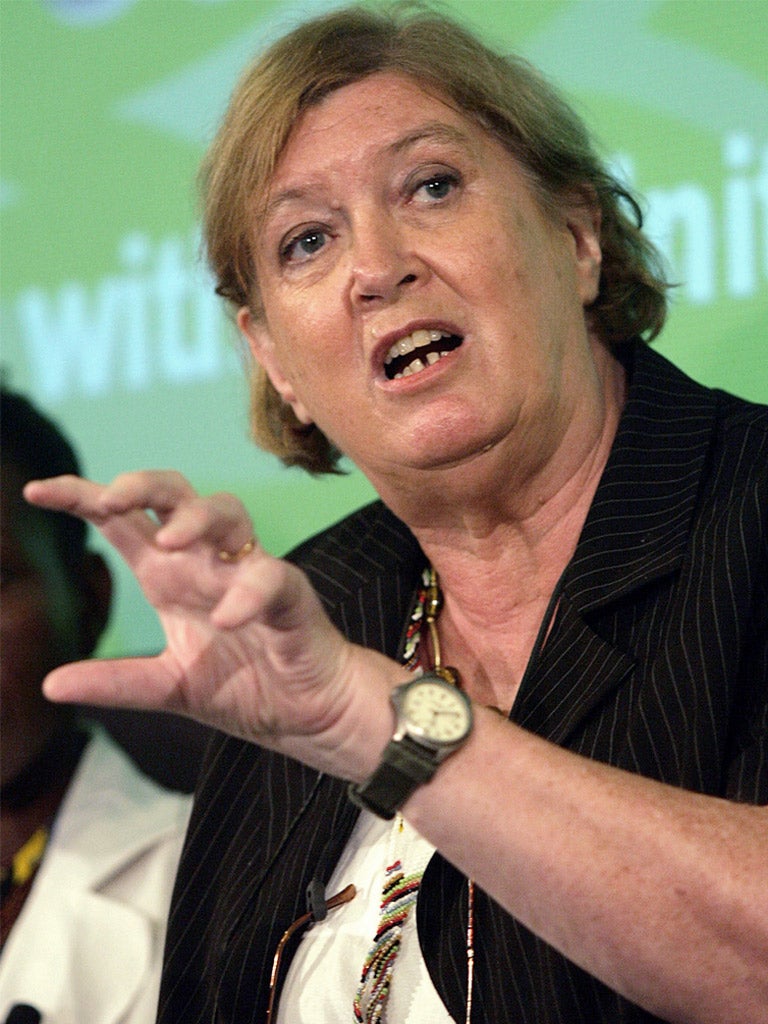Inez McCormack: Civil rights and human rights activist who fought discrimination in Ulster

Inez McCormack was a Belfast Protestant who left behind her family's unionist background to become a lifelong activist in the fields of civil rights, human rights, women's rights and fair employment. A rare bird in Northern Ireland terms, she rose to become a trade union leader in a highly male-dominated scene. Often the sole woman on boards and committees, she once remarked drily, "there is no fun in being the first woman on anything."
Although there were claims that she played a critical role in bringing peace, her most important contribution probably came much earlier when she was one of the sponsors of the MacBride Principles in the mid-1980s. This was an affirmative campaign which successfully harnessed the political and financial clout of the Irish-American lobby to pressure Westminster into toughening laws against religious discrimination.
She also spent a life immersed in issues such as equality, urban regeneration and representing low-paid workers. Her campaigning attracted praise from Hillary Clinton, who said of her: "Her efforts to promote human rights and social justice remain an inspiration to me."
Perhaps unsurprisingly, McCormack attracted less acclaim in her native Northern Ireland, where she stood out as an individual who did not fit easily into any of the familiar categories of activism. According to her fellow trade unionist Patricia McKeown, "She was internationally recognised – not always so recognised at home, but I think in recent years it has become very clear that we all owe a debt to a woman who broke the mould and never gave up."
Brought up in a sedate Protestant area of County Down, McCormack attended an all-girl grammar school where one teacher described her as "a good brain but flighty." She left at the age of 16 to work as a typist. A restless spirit, she was twice beaten up at protests, once at a Northern Ireland civil rights march and once at an anti-Vietnam war demonstration in London's Grosvenor Square.
Her interest in the civil rights movement was sparked by Vincent McCormack, who was first a boyfriend and later her husband, and who like her spent decades as an activist in fair employment and related issues.
She was radicalised by her experiences on the streets. She recalled: "I was a puzzled young Prod – until I was 17 I hadn't knowingly met a Catholic. I was a young Protestant girl who didn't understand that there were grave issues of inequality, injustice and division in our society. It wasn't that Protestants didn't suffer deprivation, but there was systematic discrimination against Catholics."
Her parents opposed her marriage to Vincent: "Mixed marriages weren't exactly popular or acceptable and there was a lot of reaction," she recalled. "Over the years they came round, more or less, but they were never comfortable with it."
She worked in the civil service and as a social worker, studying at night classes and taking a degree in history and politics. She went on to make a career in the trade union movement, becoming the first female full-time official of the National Union of Public Employees and later the first female regional secretary of Unison. In this role she represented women who worked in hospitals and schools, many of them as low-paid cleaners, home helps and nursing auxiliaries.
She accused male trade unionists of subjecting her to harassment, bullying and humiliation. "At one meeting I was booed off the platform and called scum," she recounted. "I was talking about child care and was told that it shouldn't be on a trade union agenda." One commentator wrote: "Her gift for outspoken feminism, abrasive style and single-minded determination do not make her an easy team player." Despite such resentments, she rose to become the first female president of the Irish Congress of Trade Unions, from 1999 to 2001.
She also continued her activism in many areas, serving on innumerable committees and commissions concerned with human rights and fair employment. She was involved in the Vital Voices Global Partnership, a Washington-based international women's organisation which identifies, trains and connects emerging women leaders around the world.
In 2010 her career was featured in a documentary play, Seven, which the organisation commissioned from seven award-winning playwrights to tell the personal stories of women who had worked for change in countries such as Northern Ireland, Pakistan, Afghanistan and Cambodia.
She was portrayed in an ensemble reading of the play in New York by Meryl Streep, who said of that evening: "I was mortified when the real women came up onstage and I found myself standing next to the great Inez McCormack. I felt slight next to her, because I'm an actress and she is the real deal."
In 2011 Newsweek magazine named her as one of "150 women who shake the world," the only one to come from Northern Ireland. More than a decade ago she was diagnosed with cancer which was treated by major surgery to remove what she described as "a tumour as big as a man's fist from behind the heart."
Among those who have paid tribute to her were the Irish president Michael D Higgins, the former president, Mary Robinson, and Hillary Clinton. Clinton said: "She travelled the world encouraging young women to be agents of change in their communities and countries. We have come so far in part because of her insistence on a seat at the table for women and others who have been marginalised."
David McKittrick
Inez McCormack, trade unionist and human rights activist; born Belfast 1946; married Vincent McCormack (one daughter); died Derry 21 January 2013.
Join our commenting forum
Join thought-provoking conversations, follow other Independent readers and see their replies
Comments
Bookmark popover
Removed from bookmarks